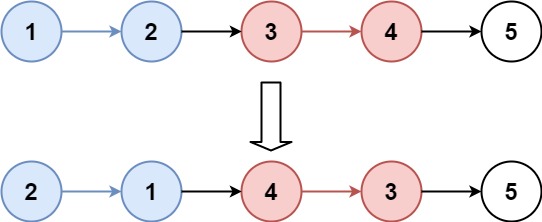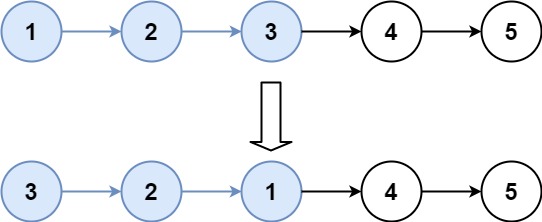source: https://leetcode.com/problems/reverse-nodes-in-k-group/
C/C++ Solution to LeetCode problem 25. Reverse Nodes in k-Group.
Problem
Given the head of a linked list, reverse the nodes of the list k at a time, and return the modified list.
k is a positive integer and is less than or equal to the length of the linked list. If the number of nodes is not a multiple of k then left-out nodes, in the end, should remain as it is.
You may not alter the values in the list’s nodes, only nodes themselves may be changed.
Examples
Example 1:
Input: head = [1,2,3,4,5], k = 2
Output: [2,1,4,3,5]
Example 2:
Input: head = [1,2,3,4,5], k = 3
Output: [3,2,1,4,5]
Constraints
- The number of nodes in the list is
n. 1 <= k <= n <= 50000 <= Node.val <= 1000
Solution
Some points to consider:
- We can only reverse complete sections so, first we move a pointer to know if we have enough nodes in the current section.
- We need to keep track of the last element of the previous reversed section in order to point its
nextvalue to the first element of the next section.
- The first node we are looking at, it’s the last element of the current section to be reversed.
- Once we move a pointer
ktimes, it is located at what will be the first element of the current section to reverse. - Having two pointers, starting from the node that will be the last of the section, we start reversing the
->nextvalue. - We keep moving and reversing until we arrive to the node that is the new first node of the section.
- We point the
->nextvalue of the last node of the previous section, to this node (the first of the current section). - Once we cannot reverse more section, we just point the
->nextvalue of the last node of the previous section to the current position.
1
2
3
4
5
6
7
8
9
10
11
12
13
14
15
16
17
18
19
20
21
22
23
24
25
26
27
28
29
30
31
32
33
34
35
36
37
38
39
40
41
42
43
44
45
46
47
48
49
50
51
52
53
54
55
56
57
58
/**
* Definition for singly-linked list.
* struct ListNode {
* int val;
* ListNode *next;
* ListNode() : val(0), next(nullptr) {}
* ListNode(int x) : val(x), next(nullptr) {}
* ListNode(int x, ListNode *next) : val(x), next(next) {}
* };
*/
class Solution {
public:
ListNode* reverseKGroup(ListNode* head, int k) {
if (k<=1 || !head)
return head;
ListNode* p = nullptr;
ListNode* p1 = head;
ListNode* p2 = head->next;
ListNode* tmp = nullptr;
ListNode* currentFirst = head;
ListNode* currentEnd = head;
ListNode* prevEnd = head;
int c = 1;
while (currentFirst) {
while (currentFirst && c<k) {
currentFirst = currentFirst->next;
c++;
}
if (!currentFirst)
break;
while (p1 != currentFirst) {
tmp = p2->next;
p2->next = p1;
p1 = p2;
p2 = tmp;
}
if (p == nullptr)
p = currentFirst;
prevEnd->next = currentFirst;
prevEnd = currentEnd;
currentEnd = p2;
currentFirst = p2;
p1 = currentFirst;
p2 = p1 ? p1->next : nullptr;
c = 1;
}
prevEnd->next = p1;
return p;
}
};


